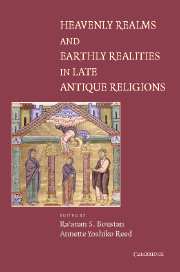Book contents
- Frontmatter
- Contents
- Preface
- List of Contributors
- Introduction: “In Heaven as It Is on Earth”
- PART ONE BETWEEN EARTH AND HEAVEN
- 1 The Bridge and the Ladder: Narrow Passages in Late Antique Visions
- 2 “Heavenly Steps”: Manilius 4.119–121 and Its Background
- 3 Heavenly Ascent, Angelic Descent, and the Transmission of Knowledge in 1 Enoch 6–16
- 4 “Connecting Heaven and Earth”: The Function of the Hymns in Revelation 4–5
- 5 Working Overtime in the Afterlife; or, No Rest for the Virtuous
- PART TWO INSTITUTIONALIZING HEAVEN
- PART THREE TRADITION AND INNOVATION
- Select Bibliography
- Index
3 - Heavenly Ascent, Angelic Descent, and the Transmission of Knowledge in 1 Enoch 6–16
Published online by Cambridge University Press: 14 July 2009
- Frontmatter
- Contents
- Preface
- List of Contributors
- Introduction: “In Heaven as It Is on Earth”
- PART ONE BETWEEN EARTH AND HEAVEN
- 1 The Bridge and the Ladder: Narrow Passages in Late Antique Visions
- 2 “Heavenly Steps”: Manilius 4.119–121 and Its Background
- 3 Heavenly Ascent, Angelic Descent, and the Transmission of Knowledge in 1 Enoch 6–16
- 4 “Connecting Heaven and Earth”: The Function of the Hymns in Revelation 4–5
- 5 Working Overtime in the Afterlife; or, No Rest for the Virtuous
- PART TWO INSTITUTIONALIZING HEAVEN
- PART THREE TRADITION AND INNOVATION
- Select Bibliography
- Index
Summary
Secrets in Heaven, Knowledge on Earth
One of the most salient features of 1 Enoch is Enoch's reception of special knowledge through heavenly ascent and angelic revelations. The exact scope of this knowledge varies among the five originally independent writings within this collection. In our earliest Enochic pseudepigraphon, the Astronomical Book (Chaps. 72–82; third century b.c.e.), the revelations to Enoch focus on calendrical and cosmological matters. The Book of the Watchers (1–36), composed slightly later, similarly uses Enoch to impart information about ouranography and geography. In that apocalypse, however, cosmological wisdom has been increasingly integrated with eschatological and ethical exhortations. A further shift away from “scientific” concerns is evident in the two subdocuments from the mid-second century b.c.e., the Epistle of Enoch (91–108) and the Book of Dreams (83–90). Like the only canonical Jewish apocalypse, the Book of Daniel (also from the mid-second century), these works equate heavenly secrets with ethical pronouncements, historical predictions, and eschatological prophecies.
Before the manuscript discoveries at Qumran exposed the early dating of the Astronomical Book and the Book of the Watchers, scholars had privileged Daniel as the paradigmatic apocalypse and thus stressed the importance of historical and eschatological concerns for the genre as a whole. The evidence of the two earlier Enochic apocalypses has not only demonstrated the priority of speculative wisdom in the apocalyptic conceptualization of revealed knowledge, it also has prompted further research into the literary strategies, epistemological concerns, and social settings that shaped the early Jewish apocalyptic literature.
- Type
- Chapter
- Information
- Publisher: Cambridge University PressPrint publication year: 2004
- 27
- Cited by



